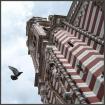Colombia
Colombia is one of the most devout countries in Latin America. Here, from 1610-1821, the Church enforced its rules from the Palace of the Inquisition in Cartagena. [1] This was one of three centres of the Inquisition in the New World, (The others were in Mexico City and Lima, Peru.) When Colombia finally became independent the citizens took away the instruments of torture and burned them. [2]
Colombia’s 1887 concordat firmly linked Church and state. Though on paper this tie was loosened by the 1973 concordat, in practice Church influence is “rarely questioned”. [3]
In 2011 a proposed pro-life amendment to Colombia’s constitution was narrowly defeated. It would have added to the article that says “The right to life is inviolable” the phrase “from conception until death”. [4] As a result, abortion still remained legal in three cases: malformation of the fetus so severe that it would die, risk of maternal death, and the result of rape. Even these exemptions have been forcefully opposed by the Church, [5] and in practice legal abortion is almost unobtainable under any circumstances. For lack of adequate contraception most pregancies are unplanned and 30% of all pregnancies end in often dangerous illegal abortions. [6]
Colombia's first concordat (1887) returned to the Church much of the power it had enjoyed in the colonial period, including the right to administer “mission territories” which comprised more than 60 percent of the country. The standard work in Spanish details all the concordats up to 1988: here are a few summaries in English from the web that show how Church and state were interwoven in Columbia. When the legal framework of Colombia changed and began to emphasise human rights, this concordat was found lacking. So much for the Vatican claim that concordats are human rights treaties....

Some Colombian concordat summaries

Concordat (1973) : text














